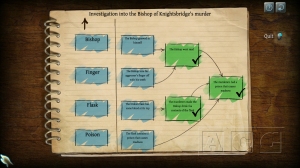Being quite the ‘Holmesian’ (a fan of things Sherlock Holmes) this was naturally one of the few games I actually desired to get on release day, and what is there that can be said about the Testament of Sherlock Holmes? Well quite a lot as it happens.
Consider this your warning that there will be spoliers within this review
The game centers on the master sleuth Sherlock Holmes, framed for all the crimes he’s ever helped solve, turned on by Scotland Yard, hounded like a criminal, and with only his (slightly faltering) loyal dog companion Dr John Watson by his side as he attempts to foil the dastardly plan of his nemesis Professor James Moriarty.

For those familiar with Sherlock Holmes, the story/theme of Moriarty trying to discredit Holmes and his crime-solving prowess, won’t be particularly new as it was the focus of the final episode of Series 2 of successful BBC One program ‘Sherlock’ (and a fine episode it was too)*. And personally, I quite liked the story; the subtle hints and references for people well versed in the story of Sherlock Holmes come across very nicely. Personally, while I’d have liked to have seen Inspector Lestrade, the throw-away mentions were nice and probably more suited to the game.
One weakness I did feel about the story is that Moriarty’s great scheme almost feels like an afterthought; something which only really takes notice in the very last part of the game. A large portion of time is given to what is, in reality, only a couple of crimes and Holmes’ deteriorating reputation. Although this does make for an engaging experience, the whole ‘master crime’ seems to be undone rather quickly; I almost wish that these were two games, one dedicated to fighting Moriarty, and another for really developing a ‘fallen’ Holmes.

This scene makes for rather poignant viewing – especially with what happens the second time around!
One thing which can’t be understated about this game is the way it looks: very nice. It’s not perfect, and compared to games which really emphasis character looks, such as L.A. Noire, it’s soundly beaten; however for a game centered on its story it looks grand. This transfers onto the various different crime scenes which you have to explore; dead bodies and intricate puzzles look very clean and copacetic on the screen and this only adds to the experience. However, although the characters of Victorian London look good, the same cannot be said of the modern day children in the attic – at times, they look frankly disturbing!
The depth of the characters doesn’t rest with the appearance however, and the voice work for both Holmes and Watson works well; the jokes and humorous one-liners (usually at Watson’s expense) are sometimes actually quite funny. However I still finished the game feeling that it wasn’t quite as developed as it could have been, and I would have liked to explore that relationship a little more. While on the topic of John Watson, I can’t help but feel that he wasn’t put to his best use in this game. There were times when his only task was to simply walk around following your every step and, when prompted, offering nothing more to the scenario than the frustratingly unhelpful ‘What next Holmes?’.

For the unobservant player, you may not even notice the point where you take over Toby the dog (a reference to Basil the Great Mouse Detective perhaps?) rather than controlling Watson.
One thing I will say is that the game does not transfer well from PC to console. I played the game on PS3, and there were points where it was so frustratingly slow and jumpy that I considered turning it off. Despite this, I did find the first person to third person camera switch a nice touch. The core mechanics of the game (investigating clues, exploring locked boxes ect ect) work well, but when it comes to actually moving around in the game it felt, to me, quite poor.
Talking about core game mechanics, I lost count of how many times I had a locked box which had to be opened in some such unique fashion. Don’t get me wrong, there was never a box locked in the same way twice, and every puzzle had its own way of being completed, but it doesn’t get around the fact that you are just trying to open yet another box. If one career was really flying in Victorian England, it was clearly being a locksmith. However, to complain about this would be churlish – you don’t pick up Fifa and complain about playing match after match; the puzzles are very interesting and there was more than one which boggled my mind enough I did have to sneak a look at a hint so it fulfills its purpose admirably.

Personally, this was one of my favourite puzzles; it certainly broke away from the normal locked box/door/object routine
Now, as far as hints go, I must also say I did find it difficult to understand exactly what I was doing at some points in the game. Occasionally you may miss a crucial piece of dialogue and then spend the next 20 minutes wandering around the room and examining the box you’ve already emptied before you finally find out you were meant to leave the building. The jerkiness of the game, when I played it at least, also meant that a few items would be overlooked – as such, when it came to needing them I’d have to spend yet another half an hour re-examining ever room for that one thing I missed. Again however, while it may be irritating (bordering on boring) to have to do this at points, this is what you expect from a Sherlock Holmes mystery game.
Not to end on a slightly deflated note, one aspect I really enjoyed was the deduction board. This was the process of not only finding all the clues and having them pieced together in a cut-scene, you actually get to follow the logic and reasoning behind each conclusion; you are effectively actually becoming the detective. However, again this is something I think the game really hit on as being brilliant but underused! There were only three separate deduction boards – when Frogware make another Holmes game (which is highly likely, I think this is their seventh!) – I really hope they put this in again.

The Deduction Board: Criminally underused, but fun to work out all the same
As such, to conclude, The Testament of Sherlock Holmes is a game for any fan of the Worlds Greatest Detective (Batman who?). It covers the ever-enigmatic Holmes as very few interpretations have ever tried to; beaten. Its not everyday you get a story of a brilliant mind who has been pushed from their position of grace, and the game covers the darkness and pressure of this fall perfectly. The puzzles are enlightening, the story line pitch perfect and even a few of the jokes come off well.
If you aren’t a fan of Sherlock Holmes, if you’ve never watched Jeremy Brett, then this game is most likely not for you, as the puzzles become slightly repetitive and the game jumps an lurches around you will probably tire rather quickly. But for the true aspiring Consulting Detective; this game is more than worth a look.
—
Pros
– Immersive story with a unique ending
– Genuinely interesting puzzles
– The characters do look very nice
Cons
– The game mechanics struggle occasionally (at least on my console they were evident)
– Watson did, at times, feel a tad useless just following you around
– It does fall into several of the pitfalls of being just like the traditional adventure/crime game
Score out of 10? A strong 7.5
* I do know ‘The Reichenbach Fall’ aired after this game was released; however I would imagine the show is a tad more successful than the game and as such more people will understand the concept from it.




 The modern sandwich is named after Lord Sandwich, but the exact reasons and causes of its invention and original use are still uncertain. One rumour that formed was the popular myth that bread and meat sustained Lord Sandwich at the gambling table. A very dedicated gambler, Lord Sandwich did not take the time to have a meal during his long hours playing at the card table. As such, he would ask his servants to bring him slices of meat between two slices of bread; a habit well known among his gambling friends. Because John Montague was the Earl of Sandwich others began to order “the same as Sandwich!” and hence the ‘sandwich’ was born.
The modern sandwich is named after Lord Sandwich, but the exact reasons and causes of its invention and original use are still uncertain. One rumour that formed was the popular myth that bread and meat sustained Lord Sandwich at the gambling table. A very dedicated gambler, Lord Sandwich did not take the time to have a meal during his long hours playing at the card table. As such, he would ask his servants to bring him slices of meat between two slices of bread; a habit well known among his gambling friends. Because John Montague was the Earl of Sandwich others began to order “the same as Sandwich!” and hence the ‘sandwich’ was born.






